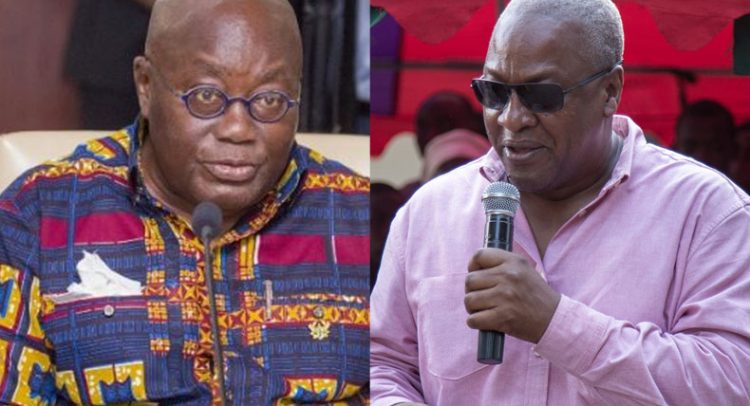President Nana Akufo-Addo and Former President John Mahama
FORMER PRESIDENT John Dramani Mahama has accused President Nana Addo Dankwa Akufo-Addo of failing the corruption test by always acquitting his appointees of any wrongdoing whenever there are allegations of corruption against them.
According to him, his government had a better record in terms of the fight against corruption as compared to the Akufo-Addo government.
He flayed President Akufo-Addo for turning his office into a clearing house within his almost two years in office where he is clearing his appointees and ministers who have been accused of corruption.
Mr. Mahama, who was addressing delegates of the NDC last Saturday at the Trade Fair Centre in Accra said: “Most appallingly, the president has become the clearing house for clearing his appointees accused of corruption. He has, on several occasions, cleared his ministers and appointees when allegations of corruption have been made against them. It was a low-day for Ghana when the president peddled falsehood on a panel at a recent South African investment forum that all allegations of corruption made against people in his administration have been investigated and cleared by independent investigative bodies. That was an obvious untruth”.
“In the fight against corruption, the NDC has a better record in terms of regime accountability. The NPP has proven in government that it is always reluctant to pursue their own despite the swelling stench of corruption around their administration”.
He feels that “what Ghanaians have seen so far is lip-service in the fight against corruption, adding that the Special Prosecutor’s Office which is a flagship programme by the NPP government has remained redundant.
According to him, the Office of the Special Prosecutor has been starved of funds, and remains starved of personnel and logistics to perform its mandate.
Meanwhile, last Thursday, November 15, 2018, government allocated GH¢180 million to the Office of the Special Prosecutor to resource it in the fight against corruption.
This was made known during the 2019 budget statement read by Finance Minister Ken Ofori-Atta on the floor of Parliament in Accra on Thursday.
According to Mr. Ofori-Atta, “Mr. Speaker, in line with government’s promise to protect the public purse, His Excellency the President remains committed to the fight against corruption. The Special Prosecutor’s Office, which is established under the Office of the Special Prosecutor Act 2017 (Act 959), is one of the highest priorities of government.
“In this budget, the Special Prosecutor’s Office has been allocated an amount of GH¢180 million from GoG with a commitment to provide additional resources during the course of 2019 to enable the Special Prosecutor’s Office carry out its mandate.”
But former President Mahama would not take any of that.
President Akufo-Addo during last week’s Africa Investment Forum in South Africa stated: “So far, investigations have not yielded any evidence but it is important that it is known that people of my administration will be subjected to scrutiny if they go off schedule.”
This, also did not go down well with Mr. Mahama, who complained that President’s claim was untrue.
Within the almost two years of NPP administration, corruption allegations against the then Minister for Energy-designate, Boakye Agyarko, during his parliamentary vetting and confirmation were subjected to a bi-partisan probe in Parliament, and it ended up exonerating him.
Accusations of corruption proffered against the two Deputy Chiefs of Staff and former Deputy Minister for Youth and Sports, Pius Enam Hadzide and Board Chairman of the National Sports Authority, Kwadwo Baah, were all investigated and acquitted of the allegations by the Police CID.
Another allegation against former CEO of BOST, Alfred Obeng, was also investigated by the Bureau of National Investigation (BNI) and he was cleared.
There was also an allegation of extortion against the Minister of Trade and Industry, Alan Kwadwo Kyerematen. That was equally scrutinized by a bi-partisan committee of Parliament which vindicated the minister.
By Vincent Kubi & Issah Mohammed


